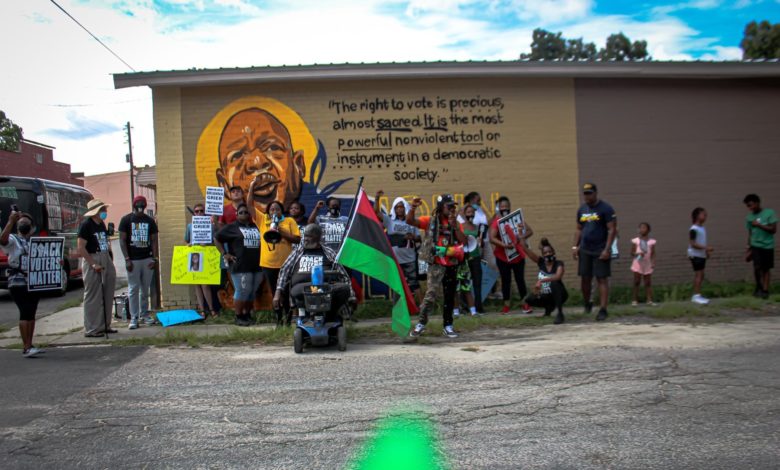
On Aug. 7, a passionate protest was held in Sparta, Georgia, in front of the Hancock County Sheriff’s office against the brutal racist negligence, which let to the death of Brianna Grier.
On July 15, Brianna Grier, a 28-year-old Black woman and mother of two, experienced a mental health episode. Grier suffered from schizophrenia and required urgent assistance. Her family called 911, but instead of receiving help from medical professionals or social workers, they were visited by sheriff’s department officers.
An altercation ensued in which the officers, totally unequipped to handle a mental health crisis, threatened Grier with a taser, handcuffed her, and threw her into a sheriff vehicle. The officers did not put Grier’s in her seatbelt or close the door, and so she fell out of the car while it was moving. She suffered significant injuries, went into a coma and died six days later.
The Hancock County Sheriffs initially claimed that Ms. Grier had opened the door herself, but after the incident received national attention, the Georgia Bureau of Investigation looked into the case and discovered through bodycam footage that the sheriff’s deputy had left the back door open while the car drove away.
In a statement on the incident, the family’s attorney, Ben Crump said, “Everybody knows that it is not supposed to be possible to open a police vehicle from the back seat, especially when a person is in handcuffs.”
At the protest Brianna Grier’s family, the Georgia NAACP, Black Voters Matter, the 100 Black Men of Milledgeville-Oconee, and other members of the community came together to demand answers from law enforcement. Despite the blazing August heat, the gathering was full of energy and emotion. The crowd came from a wide variety of backgrounds, with attendees as far as North Carolina and children as young as four standing alongside community members who have been fighting for justice for decades. The crowd was unified in its demands: Make public all body camera footage from the incident that killed Grier, release the names of the officers involved and prosecute all those responsible.
“A 911 call for a mental health disturbance should not lead to your death,” said Gerald Griggs, President of the Georgia NAACP and speaker at the event. “We want to know what happened, why it happened, why it took so long … and where do we go from here? The sheriff, he has some answering to do.”
This sentiment was echoed by the protestors, who chanted, “I smell a cover-up!” and “Prosecute the police!”
Other members of the community pointed out that the Hancock County Sheriff’s Department had killed before. In 2018, a young Black man named Dequane Rayshun Williams was killed by an officer at a traffic stop. The GBI ruled that the gunshot wound was self-inflicted, but members of the community still disagree. “It’s all a great big lie,” said the President of the Hancock County NAACP, “These things don’t add up. Hancock County deserves better and we’re going to get better.”
Speakers also addressed the lack of proper mental health care in rural Georgia and the rampant poverty that makes medical care impossible to afford. It was pointed out that Sparta, the town where the incident occurred, has next to no social services of any kind.
In fact, Sparta is part of one of the most neglected regions in the country, commonly known as the Black Belt. Originally coined in reference to the region’s fertile soils, the term now is associated with the high proportion of Black residents, most of whom are descendants of enslaved Africans brought to work the land. Today, Hancock County has one of the highest poverty rates in Georgia.
The combination of rural, poor and predominantly Black has lead to rampant abuse, harassment, and intimidation of community members from local governments and police departments. Despite that Sparta is 84% Black, in 2015 a majority-white Hancock County Board of Elections attempted to purge 150 Black people from the voter rolls, representing 20% of Sparta’s registered voters. This was ultimately overturned by a federal judge.
As with the murder of Ahmaud Arbery in Brunswick, Georgia, and now with the death of Brianna Grier, residents feel there are few repercussions for these injustices until national attention forces intervention.
The event concluded on a deeply touching note, as the four-year-old child of one of the attendees sang, “No Woman, No Cry.” Despite the song’s title, there were tears all around. The young boy ended his song with the powerful pronouncement, “No justice, no peace!”
Ignoring the demands from the movement against police brutality, on July 21, the same day as Brianna Grier’s death, the Biden Administration announced plans to invest another $35 billion into police departments around the country. Biden also committed to hiring 100,000 new police officers.
Only systemic change will stop this horrific cycle. This is understood by those who have been the victims of state violence. A local activist put it best when she turned to the sheriff station, held up a megaphone, and declared, “You can’t stop the revolution!”






